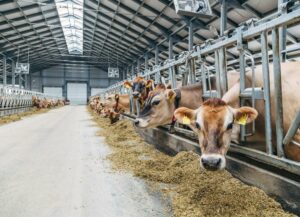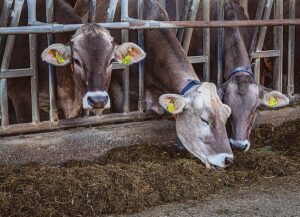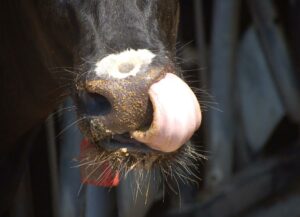Andrés Haro & Fernando Diaz
Several types of enzymes have been used as silage additives to improve the nutritive value of corn silage. One of them are proteases, which accelerate the fermentation process. The addition of exogenous protease enzymes at corn harvesting can increase starch degradability in the rumen by acting on the prolamin–starch matrix. However, it has been reported that high level of proteases may stimulate the growth of yeasts in corn silage.
A recent study conducted by Michelle et al. (2019) at the University of Delaware (Newark) evaluated the effects of an experimental food-grade acidic aspartic protease on the fermentation and nutritional value of corn silage. The protease, derived from Aspergillus niger, had 516 U of activity/mg of solids with no fibrolytic or amylolytic activity. Whole-plant corn was treated with 0, 20, 200, 1000 and 2000 mg of protease/kg of fresh matter. After the application of the protease, approximately 500 g of treated forage was ensiled in nylon-polyethylene bag and stored in the laboratory between 22 and 23 °C for 45 days.
Protease treatment did not alter the concentrations of dry matter (DM; 34.5% of fresh matter), neutral- and acid-detergent-fiber (36.1 and 20.5% DM), protein (7.5% DM), starch (35.8% DM), and water-soluble carbohydrates (1.1% DM). Treating corn silage with 20 mg/kg of protease did not increase soluble protein concentration (45.0% protein); however, application of higher doses of protease progressively increased soluble protein content (200 mg: 59.1%, 1000 mg: 67.7%, and 2000: 71.6% protein).
Proteases did not affect in vitro ruminal digestibility of fiber at 24 hours (NDF-D: 56.3% NDF) but improved in vitro starch digestibility at 7 hours. Although, treating with the lowest dose of protease (20mg/kg) did not affect starch digestibility compared with untreated corn silage (74.5% starch), higher starch digestibility (82.4% starch) was observed in corn silage treated with greater protease doses (200, 1000 and 2000 mg/kg)
In addition, the authors estimated amino acids concentrations in untreated and treated corn silage with 200 and 2000 mg of protease/kg. Silage treatment did not affect the total concentrations of essential (2.63% DM) and non-essential amino acids (6.13% DM). However, compared with untreated corn silage, protease application reduced concentrations of lysine and arginine, and increased the concentrations of leucine.
In addition, concentrations of lactic acid (5.94% DM), acetic acid (0.96%), and lactic acid bacteria (7.52 log cfu/g) were unaffected by any dose of protease. In contrast, application of high doses of protease (1000 and 2000 mg/kg) stimulated the growth of yeasts (5.63 log cfu/g) and the accumulation of ethanol (1.15% DM) compared with untreated corn silage (3.86 log cfu/g; 0.47% DM). Interestingly, lower concentrations of protease (20 and 200 mg/kg) did not alter the concentrations of ethanol nor yeast growth.
In conclusion, according to the results from this study, application of a medium dose (200 mg/kg) of exogenous acid proteases could improve starch digestibility in corn silage with short fermentation period (45 days) without affecting its fermentation profile. Application of greater doses of proteases may affect silage aerobic stability by stimulating the fermentation of yeasts.
Reference
Der Bedrosian, M. C., & Kung Jr, L. 2019. The effect of various doses of an exogenous acid protease on the fermentation and nutritive value of corn silage. Journal of Dairy Science. 102: 10925-10933.
© 2019 Dairy Knowledge Center, LLC. All Rights Reserved.











